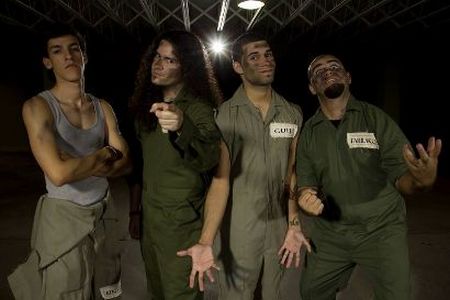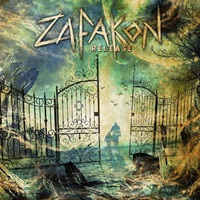Zafakon – Aggressive Release
Tuesday, 12th January 2016
Heavy metal truly has moved globally thanks to community and social connection – as we grow closer, debate, discuss, and form tight knit relationships which can blossom over the course of time. Hailing from Puerto Rico, Zafakon are a quartet of musicians who in five years have established impressive credentials on the home front while spreading their wings into the United States for a series of self-financed touring jaunts. Witnessing the group myself a couple of years back in support of their debut album War as a Drug, the band’s death/thrash stance had this element of freshness- which is now fully realized on their latest album Release.
With touring guitarist Yhann Ortiz firmly ensconced into the ranks, the four-piece feel confident to take their sound into new realms – still aggressive and death/thrash as a foundation, yet more melodic and progressive in sections that keeps “Ecosfear”, “Phantom Scream” and the nine-minute title track closer top of mind. Reaching out to bassist Weslie J. Negrón Pagán shortly before their recent late 2015 US tour dates with fellow Puerto Rico thrash band Calamity, prepare to learn more about the perseverance and tenacity it takes to succeed in a commonwealth nation of the United States more well known for its salsa and reggaeton output. An enlightening half hour conversation, where Weslie discusses his love for Opeth and Revocation, his strong commitment to exposing and making a difference regarding social injustice, as well as providing a peak into what heavy metal means to Puerto Rico (check out the documentary link in this interview too).
Dead Rhetoric: Can you inform the readers about your own personal journey into the world of heavy music and metal in general? What were some of the first bands/albums that you listened to, and at what point did you decide to pick up an instrument and start playing in bands?
Weslie J. Negrón Pagán: Ah sure. I started listening to rock music in general around 2010. That was the main year of all the music that got me here today. Bands like Into Eternity, Mercenary, obviously old school bands like Metallica, Iron Maiden, and Megadeth got me to heavy music. By meeting people and finding people that were playing instruments that’s where I got interested in playing music. I didn’t start right away playing heavy metal- I got into playing cover bands until I met the guys in Zafakon and that’s when I started playing metal. This is my first heavy metal band and it’s great, metal is something else. It’s a different form of expression, you can release your anger, happiness, stress- do anything by playing metal.
Dead Rhetoric: Now you originally learned to play the guitar before you picked up the bass, correct?
Pagán: I did, I was 12 by then. I played guitar for two months and then I quit. I told my mom that I still wanted to play an instrument but I wanted to play the bass. She ended up wasting around $70 on the guitar and had to give it away, but then I had my uncle give me my first bass and ever since then I’ve been playing.
Dead Rhetoric: What do you remember about the formative years of Zafakon? Did you have a clear idea of what you wanted the band to sound like/ look like right from the start?
Pagán: As far as the aspect visually, yes we had the right from the start. We wanted to have uniforms, but we also wanted to have an explosive live show with a lot of energy. Mostly because in Puerto Rico, there were a lot of bands who were great musically but they weren’t giving the audiences a great show for whatever reason it was. Musically, we had a base- we wanted to play thrash. Rafael (Romero) who was our first lead guitar player, he had a more death metal influence into the band. With the new music that’s changed a little bit as we’ve advanced from the previous album, but we had an idea of what we wanted musically.
Dead Rhetoric: How long did it take before Zafakon started playing out around Puerto Rico? Is it a tougher road as a thrash/death band to perform your material in English when many original bands perform with Spanish lyrics?
Pagán: It took us two months, because Rafael and Marcus (Veit) were in a band together previously and they took some of those songs to Zafakon. We had from three-five songs done, so it just took us around two months to settle those songs and make two more songs to play our first show. The aspect of playing in English isn’t tough for us- since Puerto Rico is a part of the United States as part of a commonwealth we have a very weird social situation going on. In Latin America we are the only country that has this ‘Spanglish’ situation where we mix a lot of English because we are part of the United States and we have Spanish as a first language because we were a Spanish colony before the United States took over. Most of the bands over here do actually make music here in English, we do have a big portion that make music in Spanish but most of them are not heavy metal bands. Progressive, thrash, and death (styles) are more into English. It’s better for us in English because it’s a more commercial language. It’s probably easier for Marcus to sing the lyrics in English and establish a message in English. We may do a song in Spanish eventually.
Dead Rhetoric: Inform the readers about the recording and songwriting process behind your debut album War as a Drug. Were there any particular challenges or obstacles that came up during the sessions- and how do you view the product overall now that you’ve released it and have had time to absorb everything?
Pagán: I would say for War as a Drug as a first album, when bands start out they write a lot of material and they take the best songs. The thing we did that was a mistake was the fact that we had all the songs that we wrote by the end of the album, we didn’t make a specific choice as to which songs were supposed to be there and which ones shouldn’t be there. We just went along with the ones we had. The biggest challenge is we didn’t know the whole aspect of recording, Rafael took on the recording himself. We are glad we got the material out, but we learned a lot in the process that helped with the new album. We are happy with the final product, but we should have done more. Our second album had to be way better to meet our expectations.
Dead Rhetoric: Guitarist Yhann Ortiz originally came into the band during 2013 as a live guitarist for Rafael Romero before joining on a permanent basis. Did the band have any fears about Rafael’s departure? And can you tell us what Yhann offers the band, as one would imagine your new album Release benefits from his fluid, intricate axe skills…?
Pagán: The whole situation happened two weeks before going into our first US tour. We were very nervous, we didn’t have a lot of people to learn all the songs quickly for a two-week tour, and buy your flight ticket too. We didn’t have a lot of options, but Yhann is one of the best if not the best guitar players in our generation and age group from Puerto Rico. He was the top choice for sure, after the tour we found out that Rafael had to relocate to the states and couldn’t play with us anymore. The writing process works smoothly with him because myself, Nico (Burgos) and Yhann are more into the prog side of music- we knew he was going to influence the sound. We would still keep aspects of the thrash and death side but we are going to be a little more free. Rafael wanted to play a more straightforward and violent style of music- which we liked- (but) as you grow older though you listen to more music.
Dead Rhetoric: You decided to record a three-part story and spread it out over the course of the record. What took place to combine a mini-concept as well as write non-concept songs, and where else do you see the major differences between your debut album to “Release” either on a songwriting or recording perspective?
Pagán: The whole story thing happened when we were writing all the songs. We were just talking about whether or not to make a concept album. Usually we establish that, but Marcus didn’t want to feel like he had to write a full-concept album and be closed into a cage. He wrote a mini-story about a guy who commits suicide and then regrets it. He decided to write about other topics about social stuff in Puerto Rico and the world. That’s why we decided not to make a complete concept album- he felt freer to write about anything. As far as the differences between the records, we are doing more melodic and progressive stuff with this new album. The whole writing process this time was super smooth, the songs came by themselves. The ideas came out of jams and they came into being- it doesn’t feel forced. The art goes along with the music, that’s the main difference. With Release we thought about the flow of the album, we wanted to have a really good product for a second album.
Dead Rhetoric: How do you think seeking out the services of Holy Moses’ Andy Classen for the mixing and mastering elevated the final product?
Pagán: He was great. Initially we were supposed to do the whole mixing and mastering with Dan Swanö, but timing issues came up so we couldn’t work it out. We started reaching out to people, and Andy was one of the first ones who wanted to do this. He was super excited and he did the whole thing in two weeks. We were clearly blown away- we made this decision because he knows the genre, he did research on us before taking on the job so that actually meant a lot to us. It wasn’t only another job for him- he wanted the best for the album. He did a superb job and he is an easy person to work with.
Pages: 1 2























